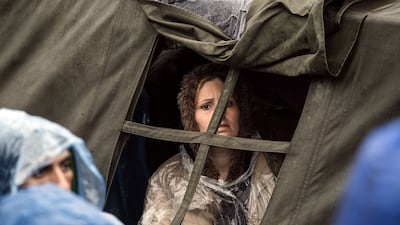Istanbul // Turkey is “not a concentration camp” and will not host migrants permanently to appease the EU, prime minister Ahmet Davutoglu said on Monday.
“We cannot accept an understanding like ‘give us the money and they stay in Turkey’. Turkey is not a concentration camp,” Mr Davutoglu said one day after talks with Germany’s Angela Merkel on the migrant crisis.
“No one should expect Turkey to turn into a concentration camp where all the refugees stay in,” he said.
The talks had however resulted in a “positive response” to the government’s request for visa liberalisation, he said.
In exchange, Mr Davutoglu agreed that “illegal immigration should be properly kept under control, therefore we will set up joint mechanisms” to contain the historic flow of Syrians and others escaping conflict, persecution and poverty who use Turkey as a gateway to Europe.
“We spoke of €3 billion (Dh12.5bn) as ‘fresh money’ but it is not a fixed sum. Our [financial] needs may increase,” he said.
Chancellor Merkel on Sunday had hailed as “very promising” progress on an EU-driven “action plan” after talks in Istanbul with Mr Davutoglu and president Recep Tayyip Erdogan.
Brussels last week offered Turkey financial help and an acceleration of its drive for EU membership among other sweeteners to persuade it to do more to tighten its border security.
Though Turkey initially poured cold water on the plan, describing it as nothing more than a draft, both Mrs Merkel and the Turkish leadership indicated that officials were making progress towards a deal on cooperation.
Meanwhile, thousands of migrants again streamed into the Balkans on Monday where tighter border controls caused tense bottlenecks, as Germany braced for anger at an anniversary rally of the anti-refugee Pegida movement.
Europe’s unprecedented influx has seen asylum seekers – mainly fleeing war in Syria, Iraq and Afghanistan – travelling via Turkey, Greece and the western Balkans, hoping to seek safe haven in Germany and other EU states.
Tensions have built along the migrant trail after Hungary shut its key borders with razor wire – diverting the flow west to Slovenia, which in turn also limited arrivals, as did Croatia.
On Monday, thousands of refugees waited in cold and heavy rain at one of the chokepoints, Berkasovo on the Serbia-Croatia frontier, where families huddled around fires and children walked barefoot in the mud.
“This is beyond our capacity,” said Czech volunteer Jan Pinos. “There is no one from the authorities here. We need police, army, some tents, food.”
He warned of “increasing tension” and desperation among pregnant women and children, including a baby that nearly died overnight in the chaos.
In Germany, authorities in the eastern city of Dresden stepped up security precautions on Monday for the first anniversary of Pegida amid warnings from senior officials that the anti-Islam group is stirring up hatred that could lead to violence.
The surge of migrants to Germany over the summer has fueled a revival of fortunes for the group – whose name stands for “Patriotic Europeans against the Islamisation of the West” – with crowds to weekly rallies growing steadily.
Last week’s protest in Dresden attracted up to 9,000 people – still far below the peak of 25,000 who rallied there in January. However, observers worry the crowd is becoming more radical. Germany’s top security official said the domestic intelligence service was monitoring Pegida and called its leaders “hard far-right extremists”.
* Agence France-Presse and Associated Press

